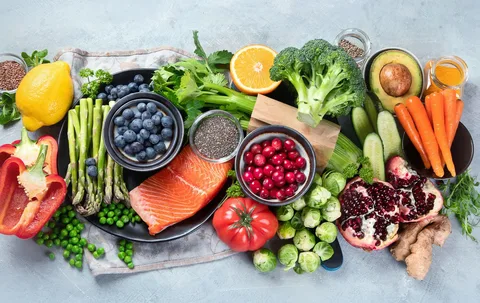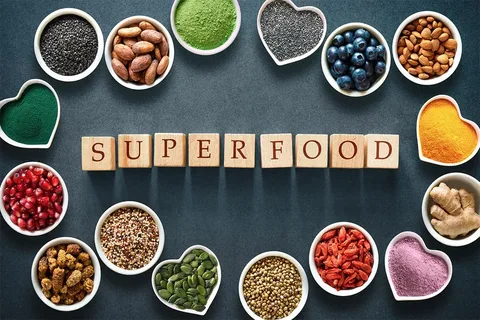In the quest for optimal health and fitness, the foods you choose to fuel your body can make a significant difference. Superfoods, packed with essential nutrients, antioxidants, and health-boosting properties, can play a crucial role in enhancing your well-being and fitness levels. This article delves into the top 10 superfoods that can help you achieve your health and fitness goals, explaining their benefits and how to incorporate them into your diet.
What Are Superfoods?
Superfoods are nutrient-dense foods that offer exceptional health benefits. They are rich in vitamins, minerals, antioxidants, and other compounds that can support overall health and well-being. While there is no formal definition of superfoods, these foods are generally recognized for their high nutrient content and positive effects on health.

Top 10 Superfoods to Boost Your Health and Fitness
1. Blueberries
Nutritional Profile: Blueberries are packed with vitamins C and K, fiber, and antioxidants, particularly anthocyanins, which give them their deep blue color.
Benefits for Health and Fitness:
- Antioxidant Power: Blueberries help combat oxidative stress and inflammation, which can aid in recovery post-exercise.
- Cognitive Function: Their high antioxidant content supports brain health, potentially enhancing focus and mental performance during workouts.
How to Incorporate: Add blueberries to smoothies, yogurt, oatmeal, or enjoy them as a fresh snack.
2. Quinoa
Nutritional Profile: Quinoa is a complete protein source, containing all nine essential amino acids. It’s also high in fiber, iron, magnesium, and B vitamins.
Benefits for Health and Fitness:
- Protein Boost: Ideal for muscle repair and growth, making it a great post-workout food.
- Energy Sustainer: The complex carbohydrates in quinoa provide sustained energy levels throughout the day.
How to Incorporate: Use quinoa as a base for salads, stir-fries, or as a substitute for rice in various dishes.
3. Kale
Nutritional Profile: Kale is a leafy green vegetable rich in vitamins A, C, and K, as well as calcium, iron, and antioxidants.
Benefits for Health and Fitness:
- Anti-Inflammatory: The high levels of antioxidants and vitamins help reduce inflammation, promoting faster recovery.
- Bone Health: Vitamin K and calcium support bone strength, which is crucial for overall fitness and preventing injuries.
How to Incorporate: Add kale to salads, smoothies, or use it as a base for a nutrient-dense wrap.
4. Chia Seeds
Nutritional Profile: Chia seeds are an excellent source of omega-3 fatty acids, fiber, protein, and various essential minerals like calcium and magnesium.
Benefits for Health and Fitness:
- Heart Health: Omega-3s support cardiovascular health, which is important for overall fitness.
- Digestive Health: High fiber content promotes healthy digestion and sustained energy.
How to Incorporate: Mix chia seeds into smoothies, yogurt, or make chia pudding by soaking them in liquid overnight.
5. Salmon
Nutritional Profile: Salmon is rich in high-quality protein, omega-3 fatty acids, and essential vitamins and minerals such as B vitamins and selenium.
Benefits for Health and Fitness:
- Muscle Repair: The protein content aids in muscle recovery and growth.
- Anti-Inflammatory: Omega-3 fatty acids help reduce inflammation, supporting overall joint and muscle health.
How to Incorporate: Grill or bake salmon for a delicious main dish, or add it to salads and sandwiches.
6. Almonds
Nutritional Profile: Almonds are a great source of healthy fats, protein, fiber, vitamin E, magnesium, and antioxidants.
Benefits for Health and Fitness:
- Heart Health: The monounsaturated fats support cardiovascular health.
- Energy Boost: Almonds provide a steady source of energy and can help maintain satiety.
How to Incorporate: Snack on raw or roasted almonds, or add almond butter to smoothies and oatmeal.
7. Sweet Potatoes
Nutritional Profile: Sweet potatoes are rich in vitamins A and C, potassium, fiber, and antioxidants such as beta-carotene.
Benefits for Health and Fitness:
- Energy Source: Complex carbohydrates provide long-lasting energy, making them an excellent choice for pre-workout meals.
- Immune Support: Vitamin A and C help strengthen the immune system.
How to Incorporate: Roast sweet potatoes, mash them, or use them as a base for soups and stews.
8. Greek Yogurt
Nutritional Profile: Greek yogurt is high in protein, calcium, probiotics, and vitamins B12 and D.
Benefits for Health and Fitness:
- Muscle Recovery: The high protein content aids in muscle repair and growth.
- Digestive Health: Probiotics support gut health, which can improve overall well-being and energy levels.
How to Incorporate: Enjoy Greek yogurt as a snack, in smoothies, or as a base for parfaits.
9. Spinach
Nutritional Profile: Spinach is packed with vitamins A, C, and K, folate, iron, and antioxidants.
Benefits for Health and Fitness:
- Muscle Function: Iron and potassium support muscle function and energy levels.
- Antioxidant Benefits: The antioxidants in spinach help reduce oxidative stress and inflammation.
How to Incorporate: Add spinach to salads, smoothies, or sauté it as a side dish.

10. Avocado
Nutritional Profile: Avocados are rich in healthy fats, fiber, vitamins E, C, K, and B6, and various minerals like potassium.
Benefits for Health and Fitness:
- Healthy Fats: Monounsaturated fats support heart health and provide sustained energy.
- Nutrient Absorption: The healthy fats in avocados help absorb fat-soluble vitamins from other foods.
How to Incorporate: Use avocado in salads, sandwiches, or as a creamy addition to smoothies.
FAQs About Superfoods
Q1: Are superfoods a cure-all for health problems?
A1: While superfoods offer significant health benefits, they are not a cure-all. They should be part of a balanced diet and healthy lifestyle. No single food can replace overall healthy habits.
Q2: How can I include these superfoods in my diet if I’m on a budget?
A2: Many superfoods can be found at reasonable prices, especially when purchased in bulk or seasonally. Opt for frozen versions of fruits and vegetables, which are often cheaper and just as nutritious.
Q3: Can superfoods help with weight loss?
A3: Superfoods can support weight loss when included in a balanced diet. They often provide essential nutrients and fiber that can help you feel fuller longer and reduce overall calorie intake.
Q4: Are there any superfoods that are particularly beneficial for athletes?
A4: Yes, superfoods like quinoa, salmon, and Greek yogurt are particularly beneficial for athletes due to their high protein content and ability to support muscle recovery and energy levels.
Q5: How often should I eat superfoods to see their benefits?
A5: Incorporate superfoods into your diet regularly, aiming to include them in several meals each week. Consistency is key to experiencing their full benefits.
